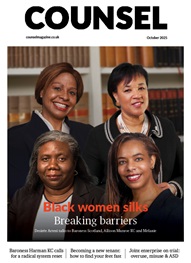*/
A campaign of “mythbusting”, flexible working opportunities and more judicial job shadowing are some of the recommendations of Baroness Neuberger’s report into judicial diversity.
The final report of the Lord Chancellor’s Advisory Panel on Judicial Diversity, chaired by Baroness Neuberger, rejects the use of diversity quotas and targets for judicial appointments. Instead, there should be a “fundamental shift in approach” towards diversity at all stages of a judicial career.
The panel’s 53 recommendations include a proactive campaign of “mythbusting” to overcome false perceptions about the reality of becoming a judge, and the evolution of the Judicial Studies Board into a Judicial College to provide training for prospective judicial applicants. There should be more judicial job shadowing, law firms should encourage part-time service, and flexible working opportunities should be assumed for all judicial posts, with exceptions needing to be justified.
Judges should engage with schools and colleges to encourage students from under-represented groups, and the legal profession should actively promote judicial office among those currently not coming forward. Nick Green QC, Chairman of the Bar, said: “A vibrant and diverse Bar is very important to a vibrant and diverse judiciary. “Women and men enter the profession in equal numbers and nearly 20 per cent of pupil barristers come from visible ethnic minority backgrounds. We have implemented several schemes which educate young people who aspire to become barristers.
“The retention of diversity is a priority. To that end the Equality and Diversity Code and Maternity Leave Guidelines promote flexible working arrangements and career breaks from practice. “We run an annual seminar on ‘Managing Career Breaks’ and have appointed Diversity Mentors on every Circuit to assist career progression.”
The panel’s 53 recommendations include a proactive campaign of “mythbusting” to overcome false perceptions about the reality of becoming a judge, and the evolution of the Judicial Studies Board into a Judicial College to provide training for prospective judicial applicants. There should be more judicial job shadowing, law firms should encourage part-time service, and flexible working opportunities should be assumed for all judicial posts, with exceptions needing to be justified.
Judges should engage with schools and colleges to encourage students from under-represented groups, and the legal profession should actively promote judicial office among those currently not coming forward. Nick Green QC, Chairman of the Bar, said: “A vibrant and diverse Bar is very important to a vibrant and diverse judiciary. “Women and men enter the profession in equal numbers and nearly 20 per cent of pupil barristers come from visible ethnic minority backgrounds. We have implemented several schemes which educate young people who aspire to become barristers.
“The retention of diversity is a priority. To that end the Equality and Diversity Code and Maternity Leave Guidelines promote flexible working arrangements and career breaks from practice. “We run an annual seminar on ‘Managing Career Breaks’ and have appointed Diversity Mentors on every Circuit to assist career progression.”
A campaign of “mythbusting”, flexible working opportunities and more judicial job shadowing are some of the recommendations of Baroness Neuberger’s report into judicial diversity.
The final report of the Lord Chancellor’s Advisory Panel on Judicial Diversity, chaired by Baroness Neuberger, rejects the use of diversity quotas and targets for judicial appointments. Instead, there should be a “fundamental shift in approach” towards diversity at all stages of a judicial career.


Justice system requires urgent attention and next steps on the Harman Review
Q&A with Tim Lynch of Jordan Lynch Private Finance
By Marie Law, Director of Toxicology at AlphaBiolabs
By Louise Crush of Westgate Wealth Management
Why Virtual Assistants Can Meet the Legal Profession’s Exacting Standards
Despite increased awareness, why are AI hallucinations continuing to infiltrate court cases at an alarming rate? Matthew Lee investigates
Many disabled barristers face entrenched obstacles to KC appointment – both procedural and systemic, writes Diego F Soto-Miranda
The proscribing of Palestine Action under the Terrorism Act is an assault on the English language and on civil liberties, argues Paul Harris SC, founder of the Bar Human Rights Committee
For over three decades, the Bar Mock Trial Competition has boosted the skills, knowledge and confidence of tens of thousands of state school students – as sixth-form teacher Conor Duffy and Young Citizens’ Akasa Pradhan report
Suzie Miller’s latest play puts the legal system centre stage once more. Will it galvanise change? asks Rehna Azim